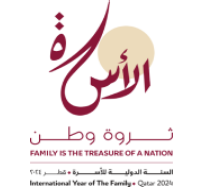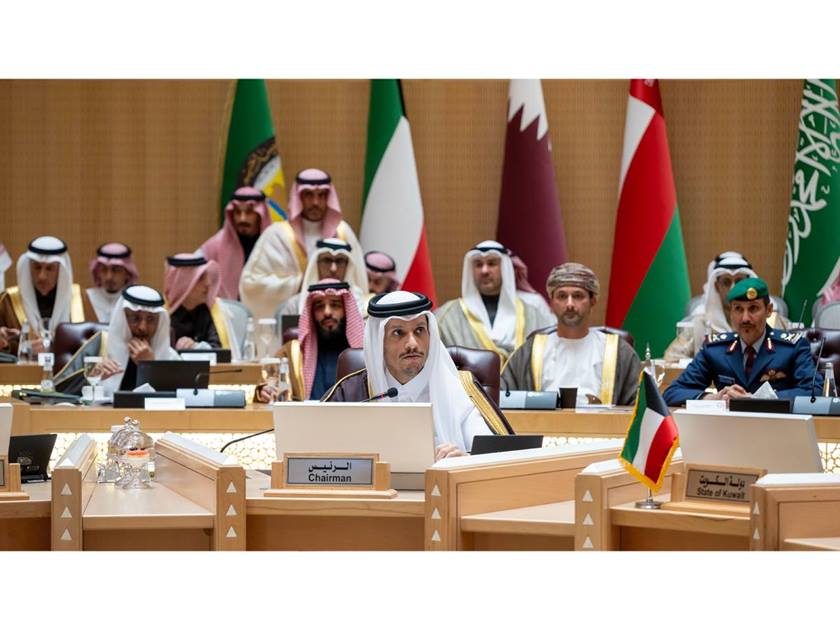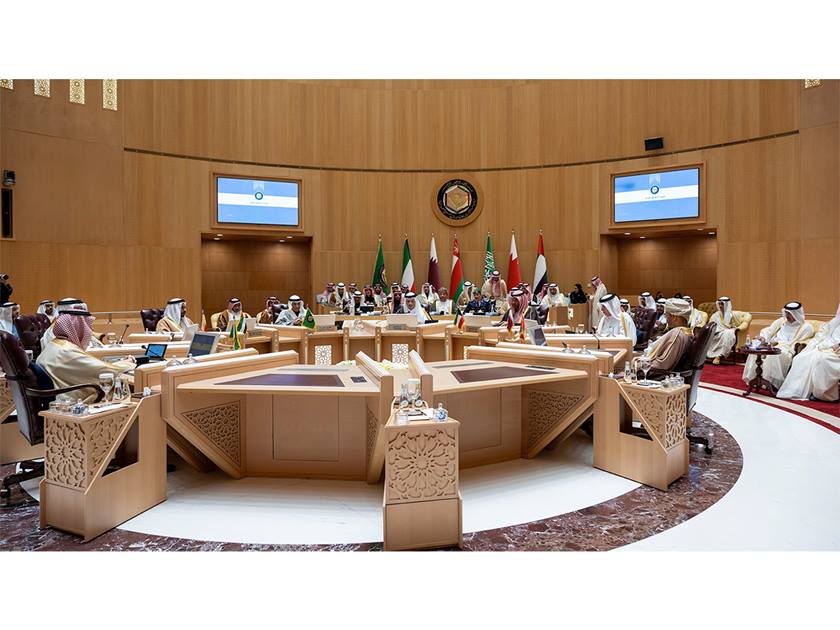Riyadh, March 03 (QNA) - The Ministerial Council of the Cooperation Council for the Arab States of the Gulf (GCC) affirmed its support for the efforts made by the State of Qatar, in partnership with the Arab Republic of Egypt, to reach a humanitarian truce agreement to alleviate the tragic humanitarian conditions in the Gaza Strip, release prisoners and detainees from both sides, and allow the entry of a larger number of humanitarian convoys and relief aid, including fuel allocated to humanitarian needs.
In the final statement of its 159th regular session, chaired by HE Prime Minister and Minister of Foreign Affairs Sheikh Mohammed bin Abdulrahman bin Jassim Al-Thani, the Council expressed its hope that these efforts would contribute to stopping the escalation and targeting and forced displacement of Palestinian civilians, leading to a complete cessation of the war on the Gaza Strip, ending the siege imposed on the Strip, and alleviating the suffering of the Palestinian people. The Council stressed the need for the international community to bear its responsibility to deal with this issue without double standards.
The Ministerial Council welcomed the results of the consultative meeting to discuss developments in the Israeli war in the Gaza Strip, which was hosted by the Kingdom of Saudi Arabia on February 8, 2024, with the participation of the United Arab Emirates, the State of Qatar, the Hashemite Kingdom of Jordan, the Arab Republic of Egypt, and the Palestinian Authority.
The Ministerial Council praised the success of Qatar's efforts in mediating the release of one of the foreign nationals held in Afghanistan. It also commended the ongoing humanitarian and relief aid provided by the countries of the Cooperation Council, emphasizing the importance of continuing humanitarian, economic, and developmental assistance from the international community to alleviate the suffering of the Afghan people.
The Ministerial Council commended the successful mediation of the State of Qatar, which resulted in the reunification of a new group of Ukrainian children with their families and the provision of medical care to them.
The Ministerial Council commended the humanitarian and relief aid provided by the countries of the GCC to Ukraine, emphasizing the importance of continuing to support all efforts to facilitate the export of grains and all food and humanitarian supplies to contribute to ensuring food security for the affected countries.
The Ministerial Council reiterated its support for the mediation efforts undertaken by the Council's countries to resolve the crisis between Russia and Ukraine, achieve a ceasefire, resolve the crisis politically, prioritize dialogue, and settle the conflict through negotiations.
The final statement of the Ministerial Council meeting praised the contents of the joint statement between the State of Qatar and the State of Kuwait following the recent visit of HH the Amir of the State of Kuwait Sheikh Mishal Al-Ahmad Al-Jaber Al-Sabah to the State of Qatar, as well as the contents of the joint statements at the conclusion of his visits to several GCC countries. The Ministerial Council confirmed that these visits reflect the established historical ties and strong brotherly relations that bring together the leaders of the GCC countries, which strengthens bilateral relations and the strategic partnership between the GCC countries in a way that benefits their interests and the prosperity of its people.
The Ministerial Council congratulated HH the Amir Sheikh Tamim bin Hamad Al-Thani on the occasion of the successful hosting of the 2023 Asian Cup, and the Qatari team's victory in the tournament, and expressed its sincere congratulations and best wishes for further progress and success for the people of the State of Qatar.
The Council praised the success of the State of Qatar in hosting (Web Summit 2024) and allocating USD 1 billion to support startups in Qatar and the region, within the framework of the Qatar National Vision 2030 to develop a competitive and diversified economy that achieves a balance between progress and values.
The Council welcomed the success of the 28th session of the Conference of the Parties to the United Nations Framework Convention on Climate Change (COP28), held in Expo City Dubai. It also welcomed the success of the World Government Summit 2024, held in the UAE. The Council welcomed the UAE's successful hosting of the 13th Ministerial Conference of the World Trade Organisation.
In the 159th session of the Ministerial Council of the Gulf Cooperation Council (GCC) in its chaired by HE Prime Minister and Minister of Foreign Affairs Sheikh Mohammed bin Abdulrahman bin Jassim Al-Thani, the Ministerial Council reviewed the latest developments in joint Gulf action and developments in political issues regionally and internationally. It reiterated the importance of strengthening economic and development integration among the GCC countries, emphasizing the need to implement the decisions of the Supreme Council regarding the Customs Union and ensuring equality of treatment for citizens of the GCC countries within the common Gulf market.
The Ministerial Council agreed to establish a high-level coordination committee for sovereign funds in the GCC countries, which will be linked to the Ministerial Council.
The final statement said that the Ministerial Council discussed the situation in Gaza, and strongly condemned the Israeli aggression against the Gaza Strip and expressed solidarity with the Palestinian people. It called for an immediate ceasefire and cessation of Israeli military operations, as well as ensuring access to humanitarian aid, basic needs, electricity, water, fuel, food, and medicine for the residents of Gaza. The Council also urged the international community to take a firm stance to protect civilians.
The Ministerial Council commended the efforts of international organizations and friendly countries in seeking a ceasefire and stopping the Israeli aggression in Gaza. It expressed disappointment at the veto of a draft resolution by Algeria in the UN Security Council on behalf of Arab countries calling for an immediate ceasefire.
The Ministerial Council called for providing international protection for the Palestinian people, calling for the protection of civilians, refraining from targeting them, and compliance and commitment to international law and international humanitarian law. The Ministerial Council expressed its rejection of any justifications and pretexts for the continuation of the Israeli aggression against the Gaza Strip, and called on the international community to take the necessary measures, within international law, to respond to the practices of the Israeli government and the policy of collective punishment it pursues against the defenseless residents of Gaza.
The Ministerial Council condemned the ongoing and repeated Israeli occupation targeting of civilian facilities and infrastructure in the Gaza Strip, including targeting hospitals, ambulances and their medical teams, refugee camps and schools.
The Ministerial Council expressed its support for the steadfastness of the Palestinian people on their land and rejected Israeli measures aimed at displacing the residents of Gaza.
The Ministerial Council praised the efforts of the ministerial committee formed by the extraordinary joint Arab-Islamic summit to discuss the Israeli aggression against the Palestinian people, with the aim of developing international action to stop the war on Gaza, and to press for the launch of a serious and real political process to achieve permanent and comprehensive peace, in accordance with approved international references.
The Ministerial Council stressed the need to adhere to the implementation of Security Council Resolution No. 2720, dated December 23, 2023, which calls for taking urgent steps to immediately allow the delivery of humanitarian aid in an expanded, safe and unhindered manner, and to create the necessary conditions for a sustainable ceasefire. The Council called on all parties to commit to implementing the resolution, welcoming the appointment of the Secretary General of the United Nations of Sigrid Kaaf to the position of Chief Coordinator for Humanitarian Affairs and Reconstruction in the Gaza Strip to monitor the implementation of the resolution in accordance with the requirements of its provisions. It also called on the Secretary General of the United Nations to work to immediately stop the Israeli aggression against Gaza to contain the war and prevent its extension to neighboring countries.
The Ministerial Council praised the efforts of the Republic of South Africa to file a lawsuit against Israel in the case of genocide against the Palestinians before the International Court of Justice, and welcomed the preliminary decision it issued on January 26, 2024, requesting Israel to implement interim measures to prevent genocide against the Palestinian people and to submit a report within a month from the date of implementation, pending the court’s examination of the genocide case.
The Ministerial Council held Israel legally responsible before the international community for its ongoing violations and attacks that targeted innocent civilians, and resulted in the killing of thousands of civilians in the Gaza Strip, most of them women and children, which is a violation of international law and international humanitarian law.
The Ministerial Council noted the aid provided by the GCC countries to the brothers in Gaza, including official and popular aid, praising the response of citizens and residents of the GCC countries to the humanitarian campaigns to alleviate the suffering of the Palestinian people in Gaza, stressing the necessity of ensuring the unhindered delivery of humanitarian and relief aid to all parts of the Gaza Strip. The Ministerial Council urged all supporters of the United Nations Relief and Works Agency for Palestine Refugees in the Near East (UNRWA) to carry out their role in supporting humanitarian missions towards Palestinian refugees inside the besieged Gaza Strip, stressing the importance of the agency continuing to perform its tasks in a way that ensures the provision of basic requirements for the Palestinians, to mitigate the effects of the humanitarian crisis witnessed in occupied Palestine.
The Ministerial Council affirmed its firm positions on the centrality of the Palestinian cause, ending the Israeli occupation, and its support for the sovereignty of the Palestinian people over all the Palestinian territories occupied since June 1967. The Council called on all countries to complete the procedures for their recognition of the State of Palestine, and to take urgent collective action to achieve a permanent solution that guarantees the establishment of an independent Palestinian state with East Jerusalem as its capital, stressing the need to redouble the efforts of the international community to resolve the conflict, in a way that fulfils all the legitimate rights of the brotherly Palestinian people.
The Ministerial Council's final statement called on the international community to intervene to stop targeting the Palestinian presence in the city of Jerusalem, the expulsion of Palestinians from their homes in East Jerusalem, attempts to change its legal character, demographic composition and arrangements for Islamic holy places, and attempts to impose Israeli sovereignty over them in clear violation of international law, international resolutions and agreements. The Ministerial Council condemned the repeated incursions by Israeli settlers into the courtyards of the Holy Al Aqsa Mosque, in a serious violation of international law and the existing historical and legal situation in Jerusalem and its holy sites, a violation of the sanctity of the Holy Al Aqsa Mosque and a provocation to the feelings of Muslims, and stressed that the continued violations and attacks on the holy sites exacerbate tension and push the situation into a continuing cycle of violence.
The Ministerial Council affirmed that the entire Durra field is located in the marine areas of the State of Kuwait, and that ownership of the natural resources in the submerged area adjacent to the Saudi-Kuwaiti divided zone, including the entire Durra field, is joint ownership between the Kingdom of Saudi Arabia and the State of Kuwait only, and they alone have full rights to exploit the natural resources in that region, in accordance with the provisions of international law and based on the agreements concluded and in force between them.
In the final statement of the 159th session of the GCC Ministerial Council, chaired by HE Prime Minister and Minister of Foreign Affairs Sheikh Mohammed bin Abdulrahman bin Jassim Al-Thani, the Council affirmed its categorical rejection of any allegations of the existence of rights of any other party in this field or the submerged area adjacent to the area divided by its specific borders between the Kingdom of Saudi Arabia and the State of Kuwait.
Regarding counterterrorism and extremism, the Ministerial Council reiterated its firm positions and decisions regarding terrorism and extremism, regardless of their sources. It rejected all forms and manifestations of terrorism and extremism and denounced their motives and justifications. The Council emphasized the importance of drying up their sources of financing and supporting international efforts to combat terrorism. It affirmed that tolerance and coexistence among nations and peoples are among the key principles and values upon which the GCC countries are built, and they engage with other nations accordingly.
The Ministerial Council highlighted the importance of enhancing relations between the GCC and sisterly and friendly countries. It also stressed the need to work with regional and international organizations to combat the phenomenon of terrorism and extremism and their serious effects and repercussions on the region, as well as their threat to international peace and security. The Ministerial Council welcomed the adoption by the Danish Parliament of the law "Prohibition of Indecent Treatment of Religious Texts," which law prohibits and criminalizes the burning and desecration of the holy Quran and sacred books. It emphasized the importance of promoting values of dialogue and respect among peoples and cultures, rejecting anything that promotes religious hatred and extremism.
The Ministerial Council reaffirmed its firm positions and previous decisions regarding the condemnation of Iran's continued occupation of the three islands (Greater Tunb, Lesser Tunb, and Abu Musa) belonging to the United Arab Emirates, reiterating support for the sovereignty right of the United Arab Emirates over its three islands, as well as its territorial waters, airspace, continental shelf, and exclusive economic zone of the three islands as an integral part of the United Arab Emirates' territory. It called on Iran to respond to the United Arab Emirates' efforts to resolve the issue through direct negotiations or resorting to the International Court of Justice.
The Ministerial Council reaffirmed its firm positions and decisions regarding relations with the Islamic Republic of Iran, emphasizing the need for Iran to adhere to the foundations and basic principles based on the United Nations Charter, international law, principles of good neighborliness, respect for sovereignty of states, non-interference in internal affairs, peaceful dispute resolution, rejection of sectarianism, and renunciation of the use or threat of force.
The Ministerial Council emphasized the importance of preserving maritime security and waterways in the region and countering activities that threaten the security and stability of the region and the world, including targeting commercial vessels, threatening maritime navigation routes, international trade, and oil facilities in the GCC countries.
Concerning Yemen, the Ministerial Council affirmed its full support for the Presidential Council under the chairmanship of Dr. Rashad Mohammed Al Alimi and the supporting entities to achieve security and stability in Yemen, as well as to reach a political solution in accordance with the GCC Initiative and its executive mechanism, the outcomes of the Comprehensive National Dialogue Conference, and UN Security Council Resolution 2216, in order to protect the sovereignty, unity, territorial integrity, and independence of the brotherly Yemen.
Regarding Iraq, the Ministerial Council reaffirmed its firm positions and decisions towards the brotherly Iraq, and its support for the existing efforts to achieve security and stability in Iraq. It stressed the importance of preserving the integrity and unity of Iraq's territories, its full sovereignty, Arab identity, social fabric, and national unity. It also expressed support for Iraq in confronting terrorist groups and armed militias, in order to uphold the sovereignty of the state and enforce the law. It praised the positive partnership between the GCC and Iraq.
The Ministerial Council emphasized the importance of Iraq respecting the sovereignty of the State of Kuwait and the unity of its territories. It called for adherence to bilateral and international commitments and agreements, as well as all relevant United Nations resolutions.
The Ministerial Council reaffirmed the Cooperation Council's steadfast support for the Hashemite Kingdom of Jordan and all the measures it takes to combat terrorism, drug trafficking, and all illegal activities that threaten the security and stability of the region. It condemned the repeated armed attacks on the Jordanian borders by drug smugglers.
The Ministerial Council affirmed that the water security of the Arab Republic of Egypt and the Republic of Sudan is an integral part of Arab national security. It rejected any act or measure that infringes upon their rights to the waters of the Nile.
The Ministerial Council reaffirmed its steadfast positions regarding the preservation of the territorial integrity of the Syrian Arab Republic, respect for its independence and sovereignty over its territory, and rejection of regional interventions in its internal affairs. It expressed support for the United Nations' efforts to reach a political solution in Syria and the efforts exerted to ensure the well-being of Syrian refugees and internally displaced persons.
Concerning Lebanon, the Ministerial Council affirmed the Cooperation Council's steadfast positions in support of the Lebanese people and its continuous support for the sovereignty, security, and stability of Lebanon.
The Ministerial Council affirmed the Cooperation Council's steadfast positions regarding the importance of protecting the sovereignty, security, and stability of Sudan, as well as the unity of its territories. It expressed support for Sudan in facing the developments and repercussions of the current crisis, and stressed the need for calm, dialogue, and unity to alleviate the suffering of the Sudanese people.
The Ministerial Council affirmed the Cooperation Council's supportive stance towards the brotherly state of Libya and the Libyan-Libyan political solution, as well as the resolutions of the Security Council. It reiterated the commitment to safeguarding the interests of the Libyan people, achieving security, stability, and development in Libya, ensuring its sovereignty, independence, and the unity of its territories, and halting any intervention in its internal affairs. The Ministerial Council affirmed the Cooperation Council's support for the Federal Republic of Somalia in everything that would support its security, stability, sovereignty, and the unity of its territories, in order to achieve a decent life for its brotherly people.
In the final statement of its 159th session, the Ministerial Council underlined the importance of restoring security and stability in the Islamic Republic of Afghanistan, in line with the aspirations of the Afghan people and for the benefit of regional and international peace and security. It condemned all terrorist attacks targeting Afghanistan, which aim at innocent civilians and civilian infrastructure. (QNA)



